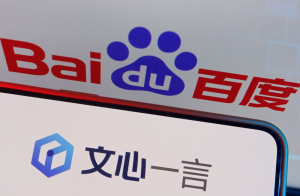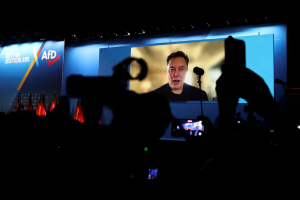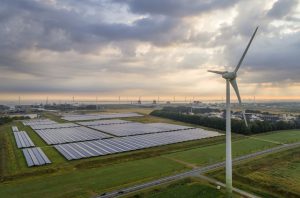Amazon is planning to develop a new material capable of removing carbon from data centres, amid increasing concerns of rising emissions from artificial intelligence-related infrastructure.
The material has been designed and improved upon by AI itself — a development Amazon described as “breaking new ground in carbon removal efficacy” in a press release.
The carbon-filtering substance is “like a sponge at the atomic level,” said Jonathan Godwin, chief executive of climate technology startup Orbital Materials, which developed the material.
Also on AF: Saudi, Oil Producing States Block Hopes for UN Plastics Treaty
“Each cavity in that sponge has a specific size opening that interacts well with CO2, that doesn’t interact with other things,” Godwin said.
Amazon’s web services unit, AWS, will collaborate with Orbital to develop the material as part of a multi-year partnership.
Orbital uses an open-source AI model to simulate advanced materials.
“Developing new advanced materials has traditionally been a slow process of trial and error in the lab. Orbital replaces this with generative AI design, radically improving the speed and efficacy of materials discovery and new technology commercialisation,” Amazon said in its press release.
It said the carbon ‘sponge’ utilises a proprietary active material, which Orbital has improved 10x using AI, since beginning work in just the first quarter of 2024.
That’s “an order of magnitude faster than traditional development,” Amazon said.
A press representative for AWS said that while the company was not yet planning to deploy the novel material at its data centres, Orbital will pilot the carbon ‘sponge’ “in an unnamed partner’s data centre.”
Race to net zero
Data centres are requiring increasing amounts of energy to sustain AI’s development and more water to keep them cool. That poses a challenge to companies like Amazon, which has committed to have net-zero carbon emissions by 2040.
Meanwhile, using the new material would also present some cost benefits for data centres. It adds up to an estimated 10% of the hourly charge to rent a GPU chip for training powerful AI. That’s only a fraction of the price of purchasing carbon offsets, Godwin said.
Amazon and Orbital did not state the financial terms of the arrangement.
But Amazon said the deal would include providing AWS customers working on advanced materials and technologies, like semiconductors, batteries, and electronics access to Orbital’s AI model.
AWS will also work with Orbital “to design, synthesise and test new technologies and advanced materials for data centre-integrated carbon removal, chip cooling and water utilisation.”
- Reuters, with additional editing and inputs from Vishakha Saxena
Note: This report was modified on 13 December, 2024, based on clarification from Amazon that it was not planning to deploy the material at an AWS data centre.
Also read:
AI Data Centres Using Much More Water Than Expected
Spotlight on Big Tech’s Power and Water Use Amid AI Surge
Big Tech’s Real Data Centre Emissions 660% Higher
Data Centre Boom Will Boost Clean Power Drive: Morgan Stanley
Amazon Joins Firms in $180 Million Brazil Carbon Credits Deal
Climate Startup Raises $32m to Bury Carbon Waste in Wells
Algae Strain Could Sequester Carbon From Oceans, Factories
Tokyo University Scientists ‘Turn Carbon Dioxide Into Green Fuel’
Fossil Fuels Set to Drive Global Emissions to a Record, Yet Again
What Will Donald Trump Mean For Global Carbon Markets?
























